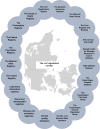A Review of Major Danish Biobanks: Advantages and Possibilities of Health Research in Denmark
- PMID: 36852012
- PMCID: PMC9960719
- DOI: 10.2147/CLEP.S392416
A Review of Major Danish Biobanks: Advantages and Possibilities of Health Research in Denmark
Abstract
Biobank research may lead to an improved understanding of disease etiology and advance personalized medicine. Denmark (population ~5.9 million) provides a unique setting for population-based health research. The country is a rich source of biobanks and the universal, tax-funded healthcare system delivers routinely collected data to numerous registries and databases. By virtue of the civil registration number (assigned uniquely to all Danish citizens), biological specimens stored in biobanks can be combined with clinical and demographic data from these population-based health registries and databases. In this review, we aim to provide an understanding of advantages and possibilities of biobank research in Denmark. As knowledge about the Danish setting is needed to grasp the full potential, we first introduce the Danish healthcare system, the Civil Registration System, the population-based registries, and the interface with biobanks. We then describe the biobank infrastructures, comprising the Danish National Biobank Initiative, the Bio- and Genome Bank Denmark, and the Danish National Genome Center. Further, we briefly provide an overview of fourteen selected biobanks, including: The Danish Newborn Screening Biobank; The Danish National Birth Cohort; The Danish Twin Registry Biobank; Diet, Cancer and Health; Diet, Cancer and Health - Next generations; Danish Centre for Strategic Research in Type 2 Diabetes; Vejle Diabetes Biobank; The Copenhagen Hospital Biobank; The Copenhagen City Heart Study; The Copenhagen General Population Study; The Danish Cancer Biobank; The Danish Rheumatological Biobank; The Danish Blood Donor Study; and The Danish Pathology Databank. Last, we inform on practical aspects, such as data access, and discuss future implications.
Keywords: biobank; epidemiology; healthcare system; precision medicine; registries; research.
© 2023 Laugesen et al.
Conflict of interest statement
MLH reports grants from AbbVie, Biogen, BMS, Celltrion, Eli Lilly, Janssen Biologics B.V., Lundbeck Foundation, MSD, Pfizer, Roche, Samsung Bioepis, Sandoz, Novartis; also reports payment/honoraria for lectures, presentations or similar. No personal income but paid to institution from Pfizer, Medac, and Sandoz; participation in a Data Safety Monitoring Board or Advisory Board. No personal income but paid to institution from AbbVie, outside the submitted work. MLH also has chaired the steering committee of the Danish Rheumatology Quality Registry (DANBIO, DRQ), which receives public funding from the hospital owners and funding from pharmaceutical companies. MLH co-chairs EuroSpA, which generates real-world evidence of treatment of psoriatic arthritis and axial spondyloarthritis based on secondary data and is partly funded by Novartis. LSS reports The Department Clinical Epidemiology is involved in studies with funding from various companies as research grants to and administered by Aarhus University. None of these studies are related to the current study. The authors report no other conflicts of interest in this work.
Figures
References
Publication types
LinkOut - more resources
Full Text Sources
Research Materials



